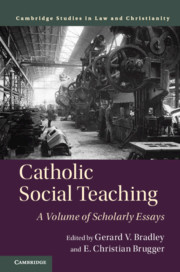Book contents
- Catholic Social Teaching
- Law and Christianity
- Frontispiece
- Catholic Social Teaching
- Copyright page
- Dedication
- Contents
- Contributors
- Acknowledgments
- Abbreviations
- Introduction Contingency, Continuity, Development, and Change in Modern Catholic Social Teaching
- Part I Historical Background
- Part II Leo XIII to Francis: The Documentary Tradition
- Part III Themes in Catholic Social Teaching
- Part IV Evaluative and Critical Reflections
- Bibliography
- Index of Names and Subjects
- Index of Ecclesiastical Texts
Introduction - Contingency, Continuity, Development, and Change in Modern Catholic Social Teaching
Published online by Cambridge University Press: 12 July 2019
- Catholic Social Teaching
- Law and Christianity
- Frontispiece
- Catholic Social Teaching
- Copyright page
- Dedication
- Contents
- Contributors
- Acknowledgments
- Abbreviations
- Introduction Contingency, Continuity, Development, and Change in Modern Catholic Social Teaching
- Part I Historical Background
- Part II Leo XIII to Francis: The Documentary Tradition
- Part III Themes in Catholic Social Teaching
- Part IV Evaluative and Critical Reflections
- Bibliography
- Index of Names and Subjects
- Index of Ecclesiastical Texts
Summary
The impulse (cupido) for radical social and political change to which Leo XIII refers in the opening lines of his greatest encyclical had stirred widespread unrest during the pontificate of his predecessor, Pope Pius IX (1846–1878). The abolition of monasteries and convents in France and Spain; Kulturkampfs in Germany and Austria,stripping the Church of its remnants of cultural hegemony; and a half-century of acrimonious conflicts with Italian nationalists, including the assassination of the papal minister in 1848 and the pope’s daring escape from the Roman mob and subsequent two-year exile in central Italy; a pontificate culminating in 1870 with the military occupation of Rome by King Victor Emmanuel,the historical mega-theft of Church property by the newly formed Kingdom of Italy, and the precipitous end to more than a thousand years of papal temporal rule.
- Type
- Chapter
- Information
- Catholic Social TeachingA Volume of Scholarly Essays, pp. 1 - 8Publisher: Cambridge University PressPrint publication year: 2019



